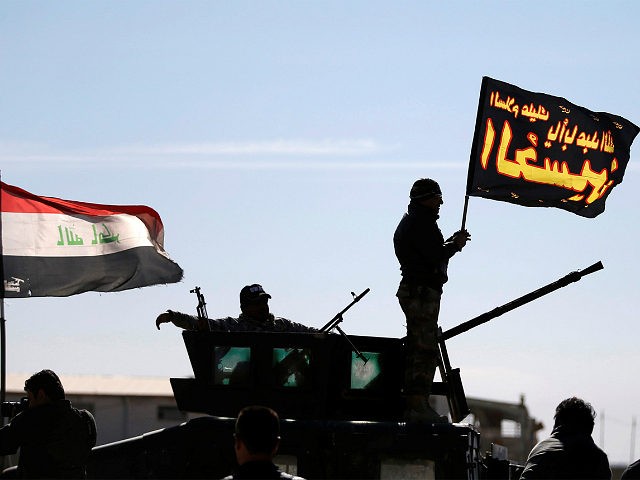Fighters from the Popular Mobilization Units (PMU), an Iraqi state-sponsored umbrella organization of mostly Iran-allied Shiite militias, have established a presence in northern Iraq’s Kurdish region with the ultimate purpose of erecting a base there, Rudaw has learned from the Kurdistan Democratic Party (KDP).
On Tuesday, Sheikh Jaafar Mustafa, a top KDP official in Khanaqin, told Rudaw that the PMU, also known as the Popular Mobilization Forces (PMF) and Hashd al-Shaabi, has been trying to recruit Iraqi Kurds.
“They have come closer to here in order to recruit Kurds and we should all stop that,” said Mustafa, noting that the Iran-backed PMU has moved some of its fighters into the region and intends to settle them in the Palkana village near Khanaqin.
“This will lead to trouble in the area and a limit should be put on these kinds of Hashd activities,” warned Mustafa
Northern Iraq’s autonomous Kurdistan Region borders Shiite powerhouse Iran, which has been designated the world’s leading sponsor of terrorism by the United States. The Iranian side is unofficially known as Eastern Kurdistan, home to the country’s Kurdish provinces.
“Khanaqin, which has a sizable Shiite Kurdish population, has been under Kurdish political, military and government administration since 2003 and on more than occasion Iraqi and Kurdish forces have come close to confrontation in the same area over issues of jurisdiction,” notes Rudaw.
Although the majority of PMU fighters are Shiite, some of them are Sunni tribesman — and Faruq Ahmad, a top official with the KDP Asayish security force, told Rudaw in December that the Iran-allied organization has established an all-Kurdish brigade. Some Christians are also reportedly fighting under the PMU.
The majority of Kurds in Iran, Iraq, and elsewhere in the region are Sunni, but there are a few Shiites.
Mustafa of the KDP noted that he is expected to meet with his counterparts from the Patriotic Union of Kurdistan (PUK) party in Khanaqin “to discuss the issue and prevent them [PMU] from forming this force in this area.”
However, Hemin Mansour, deputy head of the PUK’s branch in Khanaqin, on Wednesday dismissed the claims that the PMU has stationed its own fighters in the Kurdish city of Khanaqin as “rumors and propaganda” intended “to destabilize peace, security and co-existence in the area.”
The PUK is a longtime rival yet is a cooperating partner of the KDP when it comes to administering northern Iraq’s Kurdistan Region.
While the PUK is in charge of administering and securing the city of Khanaqin, the Kurdistan Regional Government (KRG) President Masoud Barzani belongs to the KDP.
PUK officials did express opposition to the recruitment of Kurds by the Shiite militias.
“We will certainly dismiss anyone from our party who becomes a fighter for Hashd al-Shaabi,” Aso Mamand, a senior PUK official, told Rudaw. “There is [Kurdish] Peshmerga [forces] in our areas, we do not need any other force.”
Iran is opposed to the Kurdish independence in Iraq, a desire expressed by the KRG as recently as last month, fearing it will emboldened the Kurds within its border to do the same.
The Iranian regime has accused Kurds on its soil of using the KRG region to launch attacks against the regime.
“U.S. policymakers have opposed Kurdish independence on the grounds that the breakup of Iraq would spill more Iraqi bloodshed, undermine Turkey’s security, and provoke conflict with Iran,” reports the Council on Foreign Relations (CFR), arguing that an independent Iraqi Kurdistan may provide opportunities for Washington in an unstable region.
“Iran, with a population of between five and seven million Kurds, may remain an obstacle to Iraqi Kurdish ambitions,” also notes CFR, adding, “Iran worries about the effect an independent KRG might have on its own sometimes-restive Kurdish population, as well as how a U.S.- and Turkey-aligned Kurdish state would diminish its regional influence.”
The U.S. military has been accused of arming and training Iran-backed PMU fighters believed to be committing war crimes while participating in the ongoing offensive to retake Mosul, the last major Islamic State (ISIS/ISIL) stronghold in Iraq.

COMMENTS
Please let us know if you're having issues with commenting.